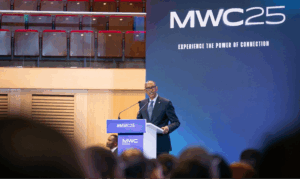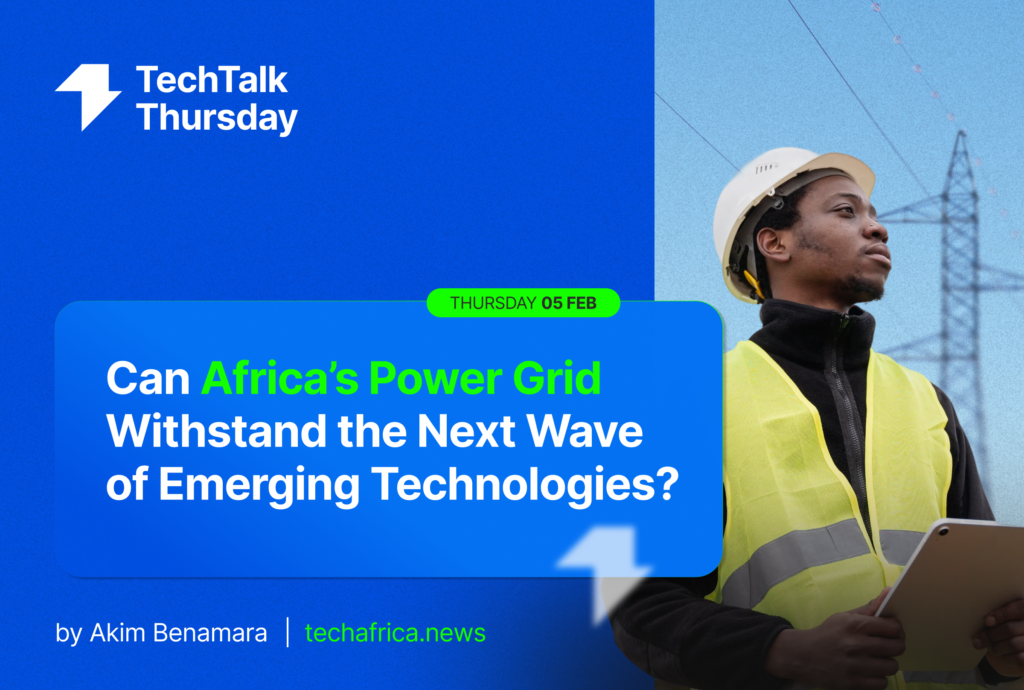A Continent in Motion: MWC25 Kigali Day One Brings Africa’s Connected Future to Life
Day One reminded everyone why MWC Kigali stands at the center of Africa’s digital story. With each passing session, the vision of a connected, innovative, and inclusive Africa comes closer to reality.
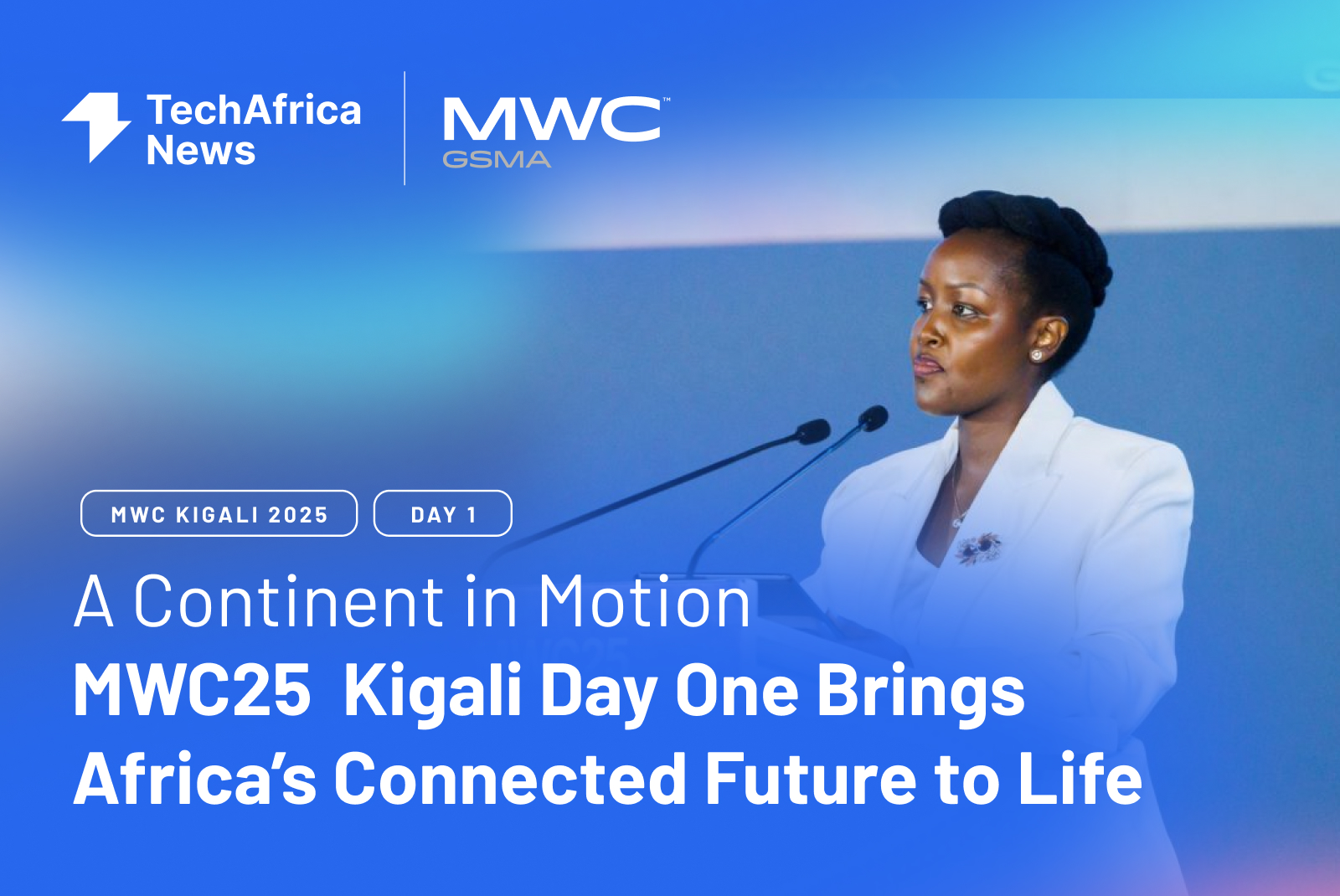
The doors to MWC Kigali 2025 opened yesterday, setting the stage for three days of high-level dialogue, innovation showcases, and strategic partnerships shaping Africa’s digital future. From the moment delegates filled the Kigali Convention Centre, the energy was unmistakable — a collective commitment to advancing connectivity, AI innovation, and inclusive digital transformation across the continent.
As an Official Media Partner, TechAfrica News was right at the centre of the action, capturing the pulse of a day defined by groundbreaking announcements and forward-looking discussions. The team engaged with industry leaders, explored cutting-edge exhibitions, and attended the most anticipated keynote sessions to bring first-hand insights from the heart of Africa’s most influential tech event.
“Throughout the day, we have witnessed an extraordinary convergence of vision, innovation, and collaboration. It is inspiring to see leaders, innovators, and policymakers come together with a shared commitment to building an inclusive, connected, and forward-looking Africa. The energy in Kigali proves that Africa’s digital transformation is not just a conversation—it is a movement happening now.”
-Akim Benamara, Chief Editor and Founder, TechAfrica News
And this is only the beginning. If yesterday’s momentum is any indication, the days ahead promise even more revelations, thought-provoking debates, and transformative ideas. Day One reminded everyone why MWC Kigali stands at the center of Africa’s digital story. With each passing session, the vision of a connected, innovative, and inclusive Africa comes closer to reality.
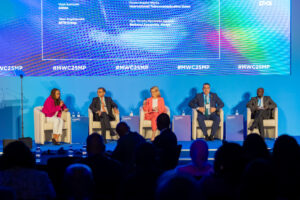
What a Way to Start: Powerful Voices Shape Day One of MWC Kigali 2025
The event opened with a powerful keynote, “Africa’s Future First: Determining the Path to a Digital Future,” led by Angela Wamola, Head of Africa at the GSMA, and featuring top voices including Doreen Bogdan-Martin (ITU), Ralph Mupita (MTN), Sunil Taldar (Airtel Africa), Hassan Jaber (Axian Telecom), Yasser Shaker (Orange MEA), and Vivek Badrinath (GSMA). The discussion set a bold tone, emphasizing collaboration, inclusion, and innovation as the cornerstones of Africa’s digital decade. From affordable connectivity and youth empowerment to AI-driven inclusion, every message pointed to one truth — Africa’s digital transformation is no longer a future goal, but a present reality taking shape through local action and global partnerships.
“Digital Africa is not a distant vision, it’s happening here, every day, led by Africans solving African challenges with global impact.”
-Angela Wamola, Head of Africa, GSMA
Speakers underscored that building Africa’s digital future will require shared responsibility and sustained investment. Doreen Bogdan-Martin called for deeper cooperation to ensure connectivity and affordability reach every corner, while Ralph Mupita stressed the need to make Africa’s languages visible online. Sunil Taldar and Hassan Jaber spotlighted the continent’s unique opportunity to leapfrog through technology and youth innovation, a sentiment echoed by Yasser Shaker and Vivek Badrinath, who urged unity across sectors. It was an inspiring start that reaffirmed one message — Africa’s digital story is unfolding now, and the world is watching.
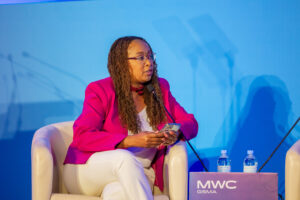
Opening Ceremony: A Call for Collaboration and Ambition
The Opening Ceremony of MWC Kigali 2025, masterfully led by Anita Erskine, Executive Director of Erskine Global Communications, brought together key voices shaping Africa’s digital trajectory. Hon. Paula Ingabire, Rwanda’s Minister of ICT and Innovation, set the stage with a compelling reflection on Rwanda’s progress — from 500,000 to 5 million active 4G users in just two years — and outlined how public-private partnerships are transforming connectivity into human capital development. She highlighted initiatives such as the Digital Ambassadors Programme and the One Million Coders Initiative, calling on Africa to “converge, connect, and create” through collaboration and locally designed solutions that can scale globally.
“The future of mobile in Africa will be defined by collaboration. We must converge across governments, industries and innovators. We must connect people, ideas and markets, and we must create solutions that are designed in Africa, built for Africa and scaled to the world. Rwanda’s story shows that when vision meets partnership, progress follows. But our journey is not yet finished. The work ahead is to make Africa not just a market for innovation but a home of product excellence and digital leadership.”
-Hon. Paula Ingabire, Minister of ICT & Innovation, Republic of Rwanda
Vivek Badrinath, Director General of the GSMA, commended Rwanda’s leadership and its commitment to inclusive digital progress, describing the country as “a catalyst for change” and a model for deliberate, technology-driven transformation.
“We are delighted and honoured to welcome His Excellency Paul Kagame to MWC Kigali once again, where we will gather with innovators, policymakers, and business leaders to address the critical issues driving Africa’s digital ambitions. I look forward to engaging with leaders from various sectors to shape the next chapter of Africa’s digital transformation, from smartphone affordability and AI adoption to connectivity and fintech solutions.”
– Vivek Badrinath, Director General, GSMA
His remarks paved the way for H.E. President Paul Kagame, who delivered an inspiring address on Africa’s shared responsibility to bridge the connectivity gap and invest in people. He emphasized that innovation can emerge from anywhere and that Africa’s strength lies in collaboration across governments, private sector, and regional blocs. “The future we must build,” he affirmed, “is an Africa that is bold, connected, and competitive.” The ceremony closed on a high note, signaling a unified vision for Africa’s digital future — confident, inclusive, and unstoppable.
“While the challenges Africa faces are significant, they also offer great growth potential if we collaborate. Governments, the private sector, and other partners should harmonize policies and create the right environment for innovation. This will enable our data and payment systems to flow securely across borders and connect our economies. The future we must build is an Africa that is bold, connected, and competitive.”
-H.E. Paul Kagame, President, the Republic of Rwanda
Continuing the Conversation: How AI is Transforming Africa’s Digital and Telecom Landscape
The second keynote of the day, Networks that Think: Harnessing AI for Scalable Telecom Growth, brought together leading voices in connectivity and artificial intelligence to explore how Africa can build smarter, more adaptive networks. Moderated by Lara Dewar, Chief Marketing Officer at the GSMA, the panel featured Zhiyong Zhang, Vice President, Huawei Carrier Business; Kate Kallot, Founder and CEO of Amini; Qiong Chen, CTO of ZTE MEA and Africa; Esther Kunda, Director General of Innovation and Emerging Technologies at Rwanda’s Ministry of ICT and Innovation; and Antoine Sebera, CEO of the Rwanda Information Society Authority.
The session unpacked how AI is transforming the telecom landscape, driving efficiency, predictive management, and localized innovation. Esther Kunda captured the spirit of the discussion, emphasizing that AI is no longer a distant promise. With AI poised to redefine the future of networks, the conversation underscored a clear message — Africa’s advantage will lie not only in adoption, but in its ability to create intelligent, inclusive systems rooted in local data, talent, and innovation.
“I know we’ve said Africa is where we leapfrog and all that, but one of the key questions is always to be like, if you leapfrog, what is the investment? You have to create the urgency to do this.
-Esther Kunda, Director General, Innovation & Emerging Technologies, Ministry of ICT & Innovation, Rwanda
Throughout the day, the discussions and deliberations made one thing clear: Africa’s digital transformation is entering a decisive phase. From AI-driven innovation to smarter, more inclusive networks, the conversations in Kigali are setting the tone for the continent’s next decade of growth and collaboration.
“Africa’s digital future is not just about connectivity but the opportunities it unlocks. From healthcare and education to entrepreneurship and governance, innovation thrives when technology, skills and collaboration converge. Ericsson is empowering Africa by transforming networks into inclusive digital ecosystems that drive progress, growth and opportunity across the continent.”
– Alain Maupin, Vice President, Head of Customer Unit East and North Africa, Ericsson
Building an Inclusive Digital Africa: Insights from the Ministerial Panel
At the Ministerial Programme, one of the most engaging conversations of the day unfolded during a panel moderated by TechAfrica News Chief Editor, Akim Benamara. The session brought together a diverse mix of voices shaping Africa’s connectivity future, featuring John Omo (ATU), Mercy Ndegwa (Meta), Anthony Mveyange (APHRC), and Endale Asrat Asfaw (Ethio Telecom).
The dialogue centered on a pressing reality: despite widespread mobile broadband coverage, millions across Africa remain offline. The discussion explored why this gap persists — from affordability and digital literacy challenges to policy constraints and uneven infrastructure.
Panellists agreed that the path to true inclusion requires more than coverage; it demands active collaboration across sectors. The session left no doubt that meaningful connectivity is now the foundation of Africa’s digital decade — and the momentum for change is building fast.
News of the Day: Big Moves in AI & Affordable Connectivity
The first day of MWC Kigali 2025 was not just about conversations—it was about action. As global and African leaders gathered, two landmark announcements from the GSMA took center stage, signaling a clear commitment to build an inclusive, connected, and innovation-driven Africa.
GSMA and African Partners Rally to Build Inclusive AI Language Models
In a bold push to close Africa’s language gap in technology, the GSMA, together with major operators and research groups, unveiled a continent-wide initiative to develop AI language models in Africa — by Africa, for Africa. The coalition includes Airtel, MTN, Orange, Axian Telecom, Ethio Telecom, Cassava Technologies, Masakhane African Languages Hub, and others. Their mission: crowd in resources across data, compute, talent, and policy to ensure Africa’s languages, cultures, and knowledge are fully represented in global AI systems.
GSMA and Six Operators Propose Minimum Standards for Entry-Level 4G Smartphones
Recognizing that device cost remains a major barrier to internet adoption, the GSMA, alongside six of Africa’s largest operators (Airtel, Axian, Ethio Telecom, MTN, Orange, Vodacom), proposed a set of baseline specifications for affordable entry-level 4G smartphones. The move is part of the GSMA Handset Affordability Coalition and aims to lower the cost barrier for new users. Estimates suggest that a $40 smartphone with these specs could bring mobile internet access to an additional 20 million people in Sub-Saharan Africa.
Together, these announcements reflect the pulse of this year’s theme, Converge. Connect. Create. From advancing Africa’s digital inclusion to shaping the continent’s role in the global AI ecosystem, Day One made one thing clear: the future of connectivity in Africa is being built right here, right now.
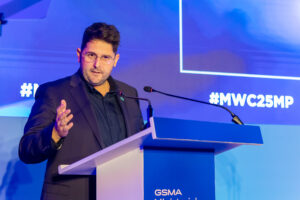
Looking Ahead: What to Expect on Day Two
After an energizing start that set the tone for collaboration and innovation, Day Two of MWC Kigali 2025 promises to deepen the dialogue around Africa’s digital transformation.
Tomorrow’s sessions will dive into the technologies driving inclusion and growth across the continent—from the power of AI and cloud to the rise of green networks, fintech innovation, and smart connectivity.
- Keynote 3: Africa’s Fintech Outlook — Visionary Strategies Shaping the Fintech Landscape | 09:30 – 10:45 CAT
Africa’s Fintech sector is entering a new era of dynamic, data-driven innovation. With over 400 million unbanked adults, the continent’s financial ecosystem is poised for exponential growth through mobile platforms, AI, blockchain, embedded finance, and real-time payments. Speakers will explore scalable strategies, investment trends, and technologies redefining financial access and inclusion.
Speakers: Kemi Okusanya (Hydrogen Payment Services), Erwan Gelebart (AXIAN Fintech), Blaise Pascal Gasabira (RSwitch Ltd), Esther Masese Waititu (Safaricom PLC), Jean Claude Gaga (Airtel Mobile Commerce Rwanda), M. Mudassar Aqil (MTN Fintech)
Moderator: Lucas Gallitto, GSMA
- Eliminating Bias: AI for Africa, by Africa | 11:45 – 13:00 CAT
This session examines Africa-focused AI developed by Africans, tackling bias, bridging data gaps, and building inclusive systems that reflect the continent’s diversity.
Speakers: Pelonomi Moiloa (Lelapa), Josephine Mukesha (National Identification Agency)
- From Smart, to AI Smart: Africa’s Business Transformation Driven by AI | 16:15 – 17:30 CAT
Telecoms play a critical role in supporting enterprises across agriculture, fintech, healthcare, and smart utilities. This session explores how AI and IoT are driving inclusive economic growth and transforming African businesses.
Speakers: Jamie Collinson (iSDA), Saad Syed (Chenosis), Mercy Ndegwa (Meta)
Moderator: Kitso Lemo, Boston Consulting Group
Tomorrow’s discussions promise to translate insight into action, spotlighting scalable solutions and collaborations that will define Africa’s next decade of digital leadership.
If Day One was about setting the vision, Day Two is where ideas turn into roadmaps—and the collaborations forged in Kigali begin to take real shape.
Stay tuned as TechAfrica News continues its on-ground coverage, bringing you the conversations, insights, and innovations defining Africa’s connected future.
